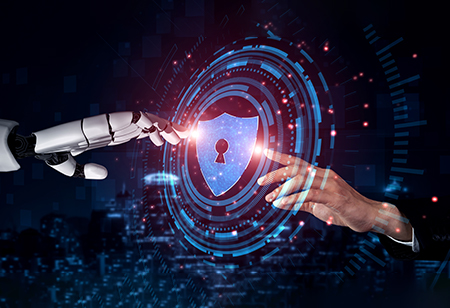
Tech CEOs Join New AI Safety Board to Barricade Critical Services


The big guns of the tech world and the US government have decided to face off with the challenges posed by artificial intelligence to barricade critical infrastructure. The two will join hand-in-hand to provide ethical guidelines services and execute vulnerability assessments to protect critical infrastructure from AI-related threats. The star-struck tech panel includes Google's CEO Sundar Pichai, Microsoft's CEO Satya Nadella and OpenAI's CEO Sam Altman, and the heads of defense contractors such as Northrop Grumman and air carrier Delta Air Lines.
Given the rapid rate at which AI is advancing, almost every industry could line up to incorporate its capabilities, especially critical infrastructure like transportation networks, airports and power grids. At the same time, its fast-paced, advancing nature could also bring problems in terms of system malfunctioning or being hacked, causing chaos and even endangering people’s lives. For the sole purpose of protecting vital infrastructure from AI threats, a special advisory board was formed.
The majority of the 22 board seats are represented by tech CEOs; among them are CEOs of Occidental Petroleum Vicki Hollub and Delta Airlines Ed Bastian. Along with a few AI researchers, the board also includes Governor Wes Moore of Maryland and Mayor Bruce Harrell of Seattle.
The board appointments coincide with a turning point in the use of AI. Governments everywhere must be ready to not only make use of the technology but also to deal with the possibility that it may be used against them. This is why there is an endless supply of new AI technologies and a constant flow of astounding improvements to existing AI tools.
The Advisory Board
Top tech company CEOs, including other prominent figures in the field will make up this board. The vision is slated to work with the US Department of Homeland Security (DHS) to lend their wisdom on ways to protect vital infrastructure from risks connected to artificial intelligence (AI).
By joining hands with the DHS, these CEOs are required to show how strong their stand is in upholding ethical AI development. With their awareness of the bad side of AI’s capabilities, they are expected to maintain full responsibility in the way they bring out the promise that the technology holds.
This partnership involves the public and private sectors as essential components, attracting the wide range of resources and skills that the two could bring.
Therefore, the plans they create are expected to use AI in ways that produce more positive outcomes than negatives when combining the knowledge and skills of both parties. The main sectors, namely telecommunications, pipeline, and electric utility, among others, are said to receive advice on the responsible usage of AI from these experts.
Few Main Areas Leaders Will Promote AI Responsibility
Cybersecurity
One of the most inevitable teething issues with AI. The newly formed advisory is expected to raise the defense on security protocols to safeguard key infrastructure from cyber attacks. This is said to include the creation of secure communication routes, stationing firm encryption standards and knitting AI algorithms that can identify and stop these attacks.
Data Privacy
Another persisting problem of protecting the privacy of sensitive data is AI systems themselves. The experts are expected to brainstorm methods of protecting information to respect people’s right to privacy. This entails strong access controls, using data anonymization methods, and abiding by tight data protection laws.
Ethical Considerations
The leaders are expected to address the concerns of the applicative value of AI in an ethical manner. The board is said to look into ensuring that AI technologies are developed and implemented following moral standards, social norms and human rights. Some moral standards are expected to roll out across purposes of AI research and development, evaluating the ethical implications of AI and encouraging accountability and openness in AI decision-making procedures.
The advisory is said to aim for encouraging responsible AI development, while reducing potential hazards related to its deployment in settings involving vital infrastructure by addressing these important issues. Hazard minimization is just as important as optimizing AI’s advantages. The advisory board acknowledges that artificial intelligence (AI) has the ability to significantly improve the effectiveness, dependability, and security of critical infrastructure systems.
Other Goals on the Agenda
Spotting Emerging Problems
Powered by AI, predictive maintenance systems could aid in spotting any problems in the transportation or electricity grids before they wreak havoc, decreasing downtime and lowering the risk of expensive breakdowns. Also, AI-driven optimization algorithms can enhance the effectiveness of traffic control and resource allocation, resulting in less congestion and more seamless operations.
Supporting Decision Making
When combining AI-enabled decision support systems, the human mind can make more smarter and quicker decisions, especially under pressuring situations like an emergency scenario for example. Mainly, the human hand at critical infrastructure services or industries home the skills in a way that is flexible with the dynamic needs and problems by utilizing AI.
Creating Balance Between AI’s Advantages and Reducing Risks
The advisory board's ultimate objective is to achieve a balance between utilizing AI's advantages and reducing its risks. They want to create comprehensive plans for the safe and responsible deployment of AI in critical infrastructure by promoting collaboration between industry leaders, governmental organizations, and other stakeholders.
This effort highlights the value of proactive collaboration between the public and business sectors and is a critical step forward in addressing the issues posed by AI. Under the direction of visionary leaders such as Satya Nadella and Sundar Pichai, the advisory board is well-positioned to make significant progress in protecting our vital infrastructure and guaranteeing a safe and prosperous future for everybody.

